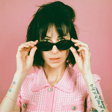
Jen Michalski
Jen Michalski currently lives in Carlsbad, California. She graduated from St. Mary’s College of Maryland with a BA in English and received her MS in Professional Writing from Towson University. She was voted one of the best authors in Maryland by CBS News, one of "50 Women to Watch" by The Baltimore Sun, and "Best Writer" by Baltimore Magazine (Best of Baltimore issue, 2013).
Her new novel ALL THIS CAN BE TRUE was released by Turner/Keylight in June 2025. Her debut novel THE TIDE KING was published by Black Lawrence Press (2013; winner of the Big Moose Prize and "Best Fiction," Baltimore City Paper, 2013), and also her second novel, THE SUMMER SHE WAS UNDER WATER (Black Lawrence Press, December 2017). Her last novel, YOU'LL BE FINE, was a 2021 Buzzfeed "Best Small Press Book," a 2022 Next Generation Indie Book Awards Finalist, and was selected as one of the "Best Books We Read This Year" by the Independent Press Review. She is the author of three collections of fiction, CLOSE ENCOUNTERS (Dzanc Books, 2007) and FROM HERE (Aqueous Books, 2014), and THE COMPANY OF STRANGERS (Braddock Avenue Books, 2023), as well as a collection of novellas, COULD YOU BE WITH HER NOW (Dzanc Books, 2013). She also edited the anthology CITY SAGES: BALTIMORE (CityLit Press 2010), which Baltimore Magazine called "Best of Baltimore" in 2010.



















